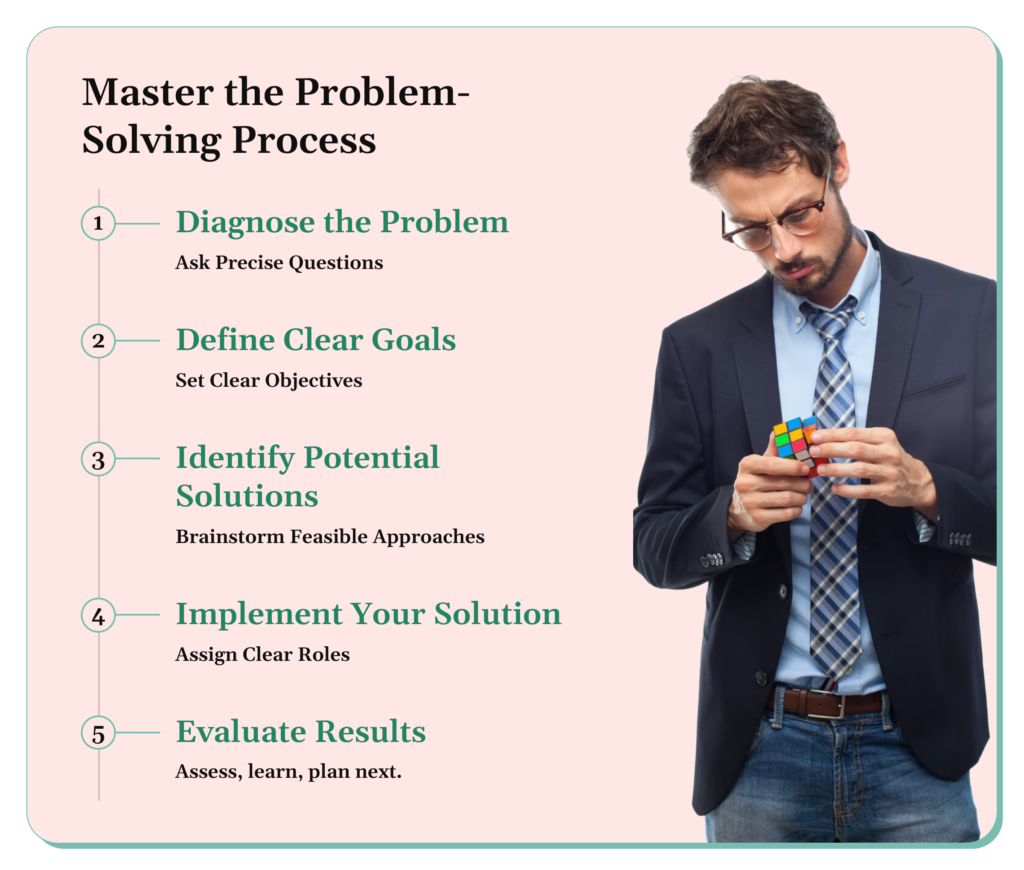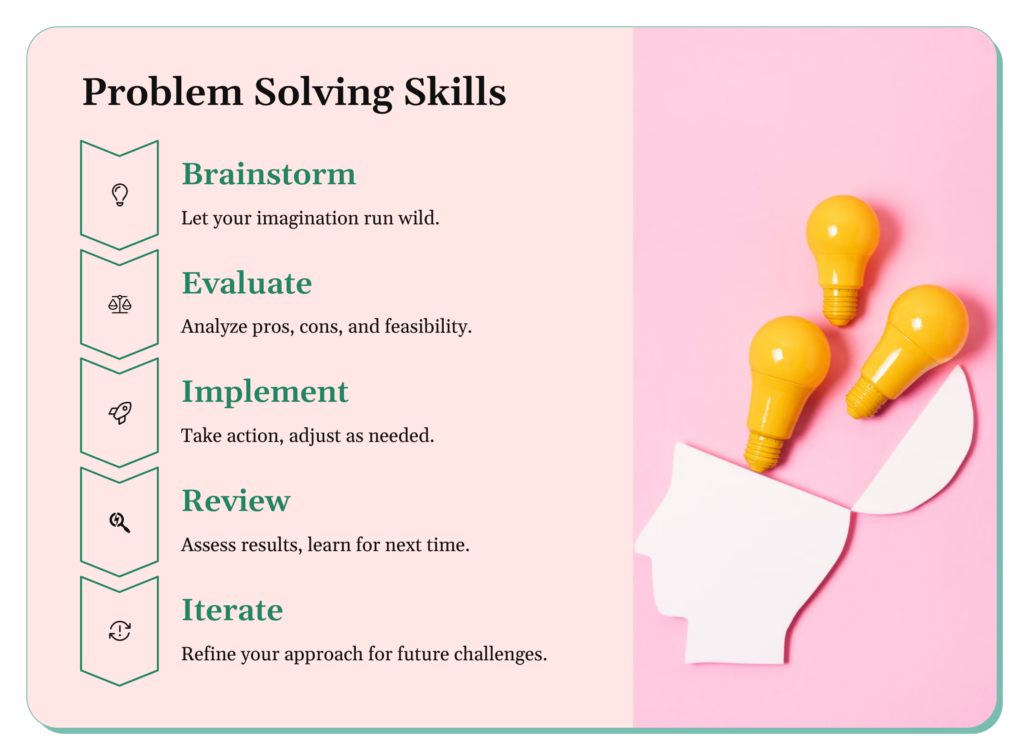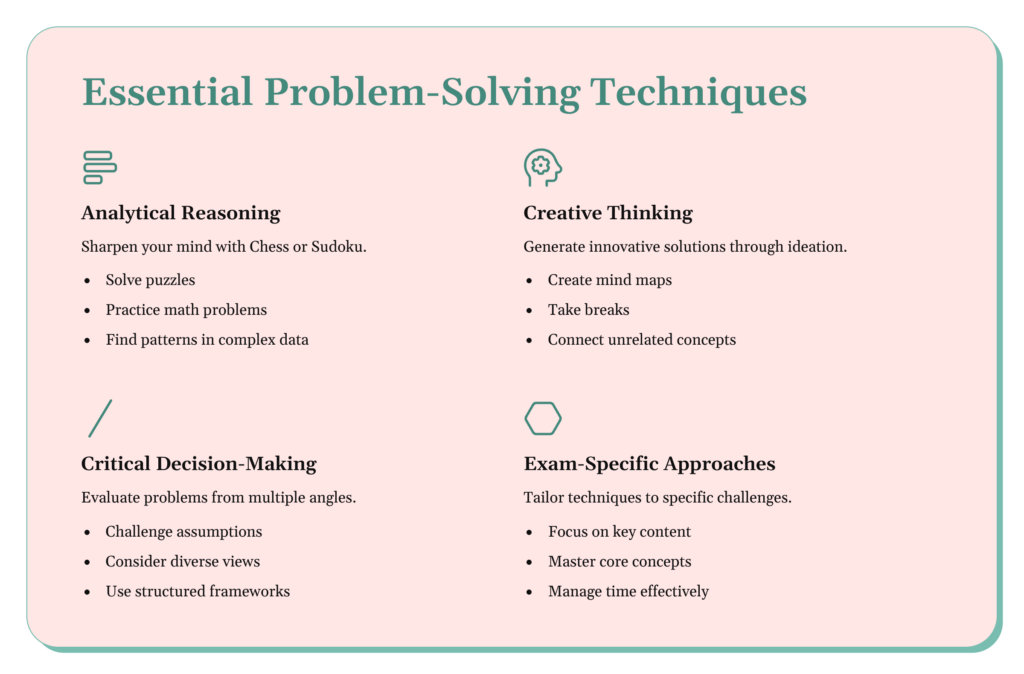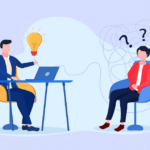
Quick Summary
Table of Contents
“You’re faced with a tricky situation at work, a challenging coding problem, or a complex personal decision. Your heart races, your palms get sweaty, and your mind goes completely blank. Sound familiar?”
That’s where solid complex problem-solving skills come in handy. They’re not just for tech gurus, they’re essential tools for everyone, every day. According to Abraham Lincoln “Give me six hours to chop down a tree and I will spend the first four sharpening the axe.“ This famous quote depicts the importance of problem-solving skills.

How to improve problem-solving skills isn’t just about taking tests or impressing your boss (though those are nice perks). It’s about growing as a person, boosting your confidence, and opening doors to new opportunities you might never have imagined. Currently, 62% of recruiters are seeking people who can solve complex things. Whether you’re debugging code that refuses to cooperate, engineering the next big thing that could change the world, or just figuring out how to organize your chaotic schedule, these skills are your trusty sidekick.
So, let’s roll up our sleeves and get into the nitty-gritty of becoming a complex problem-solving pro.
Problem-solving is an ability and a process. It is an ability that enables one to solve problems at home, at school, overseas, and in social situations, while as a process, problem-solving is the set of steps that one follows in coming up with an answer to questions or concerns that arise throughout life.

At the heart of how to improve problem-solving skills lies a set of core techniques. These are your go-to strategies, applicable across various fields and situations. Think of them as the Swiss Army knife in your mental toolkit – versatile, reliable, and always ready when you need them.

A big, intimidating problem can feel overwhelming. Instead of panicking, break it into smaller, manageable chunks. It’s like eating an elephant—one bite at a time. This approach makes even the most daunting tasks feel achievable.
Let your imagination run wild. No idea is too crazy. Some of the world’s greatest inventions started as “ridiculous” ideas. Jot down every possible solution without judgment—you never know which idea might lead to the perfect fix.
Once you have a list of potential solutions, critically analyze each one. Weigh the pros and cons, considering feasibility, required resources, potential outcomes, and possible obstacles. This step helps you zero in on the most effective solution.
Choose the best solution and take action. A good plan executed today is better than a perfect plan delayed indefinitely. Avoid getting stuck in analysis paralysis—sometimes, you need to dive in and adjust as you go.
After implementation, assess the results. What worked? What didn’t? Reflection is key to growth and ensures you learn from every experience.
Complex Problem-solving is an ongoing process. Use lessons from past experiences to refine your approach and tackle future challenges more effectively.
Now, let’s explore how to improve problem-solving skills in specific areas. Whether you’re a budding programmer dreaming of creating the next big app, an aspiring engineer with visions of innovative designs, or a student preparing for competitive exams, we’ve got you covered.
In the fast-paced world of technology, knowing how to improve problem-solving skills in programming is like having a superpower. Here’s how you can level up your coding game:
For those wondering how to improve problem-solving skills in engineering, here are some targeted strategies:

Wondering how to improve problem-solving skills in general? Here are some universal tips that apply across all fields:
Let’s dive deeper into how to improve analytical and problem-solving skills, how to improve complex problem-solving skills, and more.

To learn how to improve logical reasoning and problem-solving skills, and boost your analytical prowess, follow the tips below:
Wondering how to improve your creative problem-solving skills? Try these techniques:
For those pondering how to improve critical thinking and problem-solving skills or how to improve decision-making and problem-solving skills, consider these strategies:
Preparing for exams requires a targeted approach. Here’s how to fine-tune your skills for specific tests:
If you’re wondering how to improve your problem-solving skills for JEE, try these tips:
For those wondering how to improve problem-solving skills in physics:
The improvement of one’s problem-solving skills is not merely associated with doing well in examinations or assignments; rather, it involves equipping one’s mind to meet life’s challenges with a sense of confidence and creativity. Every problem is growth, whether it is debugging a stubborn piece of code, solving an engineering challenge, or managing everyday tasks. There are no failures, but steps toward breakthroughs; those discoveries that today rank among the greatest in the world have emerged from problems defined as impossible.
Stay curious, keep the practice alive, and welcome challenges. The problem-solving skills carry a person forward in his or her career and new and beneficial relationships with others. The most significant part is to keep challenging oneself by asking, “How could I solve this?”-it is this mindset that transforms obstacles into stepping stones for success.
Enhancing one’s problem-solving skills is a continuous journey that enriches both personal and professional dimensions. Decomposing problems, brainstorming out-of-the-box solutions, and analyzing consequent effects cultivate a certain way of approaching problems. Diligent practice of a problem-solving mindset, lessons learned from doing something wrong, and an open attitude toward new ideas only bolster this ability to think critically and make sound decisions. Whether it is in academics, work, or everyday life, truly, problem-solving ability is the main line toward prosperity. Keep on perfecting your strategies; nourish your curiosity and consider challenges to be opportunities for growth and innovation.


Ans. The core techniques include breaking down problems into manageable parts, brainstorming a wide range of solutions, carefully evaluating options, implementing the best solution, reviewing the outcomes, and iterating based on what you’ve learned. Regular practice and exposure to diverse problems also play a crucial role.
Ans. To improve your programming problem-solving skills, practice coding regularly, tackle coding challenges on platforms like LeetCode or HackerRank, learn and apply various algorithms and data structures, engage in pair programming, and regularly review and refactor your code. Additionally, working on personal projects can provide real-world problem-solving experience.
Ans. Problem-solving skills are crucial in the workplace for handling daily tasks, managing projects, resolving conflicts, and driving innovation. They help employees navigate challenges, make informed decisions, and contribute to the overall success of the organisation. Strong problem-solving mindset skills can also lead to career advancement opportunities.
Ans. To boost analytical and logical reasoning skills, engage in activities like solving puzzles (e.g., Sudoku, crosswords), playing strategy games (e.g., chess), practising logical reasoning problems, and studying mathematics. Reading books on logic and critical thinking can also be beneficial. Regular practice and challenging yourself with increasingly difficult problems is key.
Ans. To enhance creative problem-solving mindset, engage in open-ended brainstorming sessions, use mind-mapping techniques to visualise problems and solutions, practice lateral thinking exercises, and allow incubation time for ideas. Exposing yourself to diverse experiences and perspectives can also stimulate creativity. Remember, sometimes the most innovative solutions combine ideas from different fields.
Ans. It’s all practice and patience; the more problems you solve, the better you get. The chances are that you’ll get some wrong, but that’s okay. Take it one careful step at a time over the five stages to assess your choices and ask for support from others on your project when it feels right. In just a few projects, you will have strengthened your problem-solving mindset.
Ans. There are five steps that one must follow to solve a problem successfully. These steps include:
1. Identifying and understanding the problem.
2. Research systems and practices related to the problem.
3. Visualising the problem.
4. Generating as many ideas as possible to solve the problem.
5. Choosing the best one.
Top 15 Communication Skills for Today’s Leaders – Mastering the Enhanced Communication

Authored by, Amay Mathur | Senior Editor




Amay Mathur is a business news reporter at Chegg.com. He previously worked for PCMag, Business Insider, The Messenger, and ZDNET as a reporter and copyeditor. His areas of coverage encompass tech, business, strategy, finance, and even space. He is a Columbia University graduate.
Editor's Recommendations
Chegg India does not ask for money to offer any opportunity with the company. We request you to be vigilant before sharing your personal and financial information with any third party. Beware of fraudulent activities claiming affiliation with our company and promising monetary rewards or benefits. Chegg India shall not be responsible for any losses resulting from such activities.
Chegg India does not ask for money to offer any opportunity with the company. We request you to be vigilant before sharing your personal and financial information with any third party. Beware of fraudulent activities claiming affiliation with our company and promising monetary rewards or benefits. Chegg India shall not be responsible for any losses resulting from such activities.